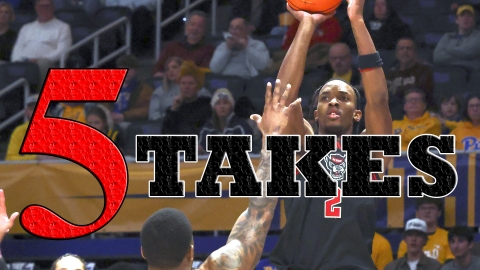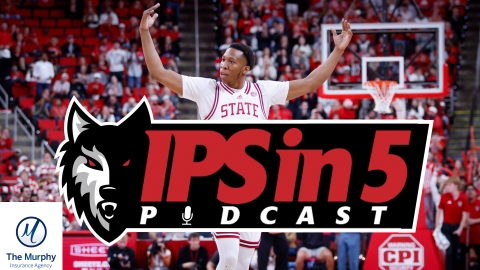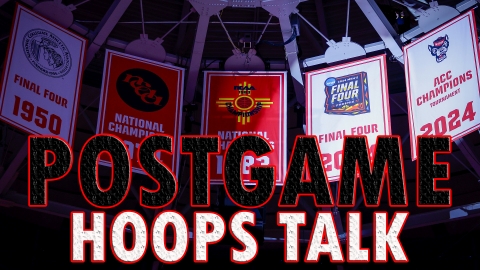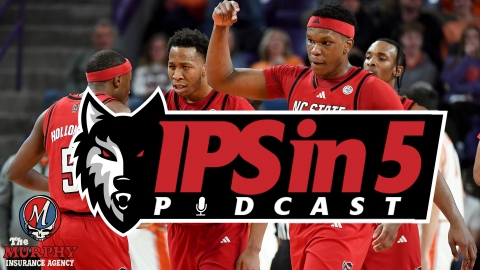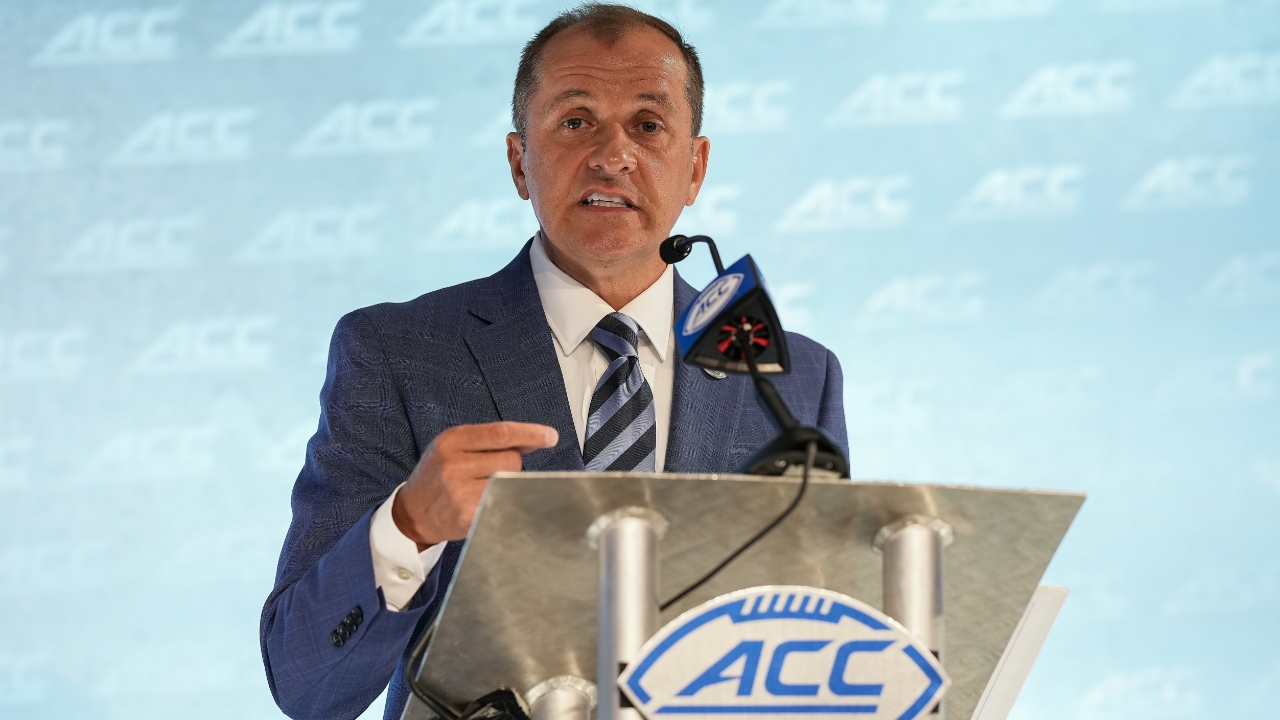
ACC Commissioner Jim Phillips answered questions from the media at the 2021 ACC Men's Basketball Kickoff.
Opening Statement...
Just many thanks to those in attendance. There's nothing like being together, right, Kelsey? I really appreciate the media showing up today, all our friends here at the Marriott. They've done a great job to host us here for the next couple days.
And some welcomes, right, two new coaches in the league, Earl Grant at Boston College. Really well-seasoned coach. Did a great job at College of Charleston before moving to BC. And then Hubert Davis. Excited to have one of our own back home. Great player for the legendary Dean Smith, and then had a stellar NBA career for 13 years before taking over and working for Coach Williams for over a decade and taking over. I do want to say something about some of the transitions that occurred in the spring.
First I'll start with Mike Krzyzewski and his announcement of retirement at the conclusion of this upcoming season, and I'm thrilled there will be one more go-around for him. He's meant so much to the game, 1170 victories, Hall of Famer, so we'll get a chance to, I think, recognize him.
Most of these opening comments I want to direct towards Roy Williams, and I don't think you can really express what he has meant to not only Carolina and the ACC, but to college basketball. Nobody won 900 games quicker than Coach Williams did. National Championship coach, but an even better person. I think we've all heard the testimonies of just what he's meant to all of his former players, and he's going to be missed. We're going to miss him in the ACC; 904 career victories, and he's meant so much to us. But he'll be around, and we'll certainly get a chance to see him, but there won't be that last kind of season for him. We've all had a chance to enjoy that.
What will be etched in my mind is I had a chance to see the Duke-Carolina game at the end of the year. There was just a few people there. We had restrictions on the sellout. And I remember because it was senior night that he kissed the floor as he walked off, and what an appropriate way to say goodbye to a school that he loves and a team that he loves. Again, many thanks to Coach Williams.
You mentioned what they mean to basketball, and you're a huge basketball fan. That's how your career started, as a manager, an assistant coach. What is it about this sport that really drew you in?
It's meant everything to me.
Growing up in the city of Chicago and being one of 10 children, that was a sport that we played. I knew I never would have the ability to play collegiately. Just wasn't skilled certainly enough to do that. But I wanted to stay part of it. It meant everything to me, and so went and became a manager and did all the things managers do. That's where the love affair started in this, I think.
Really blessed passion that I've been able to follow, and it led to being a restricted earnings coach and a graduate assistant and then morphed into athletic administration. But it was that first experience of serving young people, serving student-athletes and doing everything you could during a really important time in their life.
Two of the highlights for me just have been to serve on both the Women's NCAA basketball committee as well as the men's basketball committee. When I got the initial call to come to the ACC potentially, and if I'd have interest, I would tell you that was at the very top of why I wanted to come was just the history and tradition of this incredible league. I think it's as good as any. I've really been blessed that the sport of basketball has meant a lot to me and I've been a beneficiary of it.
As we get ready for the season and talking basketball the next few days with the coaches and players, what is it about this season and this time that you're looking forward to the most?
There's several things. I probably would say three or four. One is I'm super excited for the student-athletes. They've had two seasons interrupted over a period of time, disruption in their traditional seasons, so I'm excited about them being able to come back and play a full non-conference, conference, and into tournament play. Second, I'm excited for our fans.
They've missed coming to these great venues that we have across our 15 schools, whether it's up at the dome in Syracuse or at the Joyce Center, Kameron or Dean Smith Center, wherever that is, our fans have missed coming to games and enjoying it like they have in the past. Our student-athletes have missed our fans being there, so that's second. Third is I think it'll be a ferocious fight to the championship for both sides, the men's side and the women's side.
They talk about chaos in other sports. I think you'll see chaos in hoops, too, because the rosters look different and there's eligibility right now since the spring for transfers immediate. So it will be a lot of fun, and it will culminate in two great venues, two great cities, in Brooklyn on the men's side for the ACC Men's Basketball Championship, and then on the women's side back in Greensboro, where the support is just absolutely tremendous.
We'll populate the NCAA Tournament like we always do. We just will. 17 NCAA championships; three in the last six years; we have 11 teams ranked in the top 25, which is tied for any conference in the country, both on the men's side and the women's side. I think it's going to be a really exciting season.
We're looking forward to it and looking forward to learning more about these teams. We've been talking already this morning just about how we're all still trying to figure out who's on the teams because of all the transfers we've seen this year. Another big announcement in this off-season was about the alliance and the future with the alliance and the Big Ten and the Pac-12. As it relates to basketball and scheduling on both men's and women's side, is there anything you can share with us there?
Well, first I think just to go back, the two overriding principles of that, one was to do something for the stabilization of, I think, hopefully college sports, certainly the Power Five and maybe other conferences, to stabilize it in a rocky period. Second was to be creative and create some expansion without changing membership and having major disruption of changing membership.
I think you're going to see that. I really do. There are three things that we have and consistently worked on over the last 45 to 60 days in our weekly meetings. One is the student-athlete experience, best practices on and off the court, what are the things that we can and should be doing for our student-athletes that represent 28,000 young men and women over the 41 schools. Second is to come together on legislation and issues, future of college athletics with like-minded schools and to work collaboratively with all conferences, but certainly start within the framework of the three Power Five conferences.
Third is scheduling, as you mentioned. It's harder to do in football, a little easier to do in basketball. You'll see this year 51 games, 28 against the Big Ten, 23 against the Big Ten and Pac-12 on the men's side and 23 on the women's side. So you'll see 51 games populated across those three conferences, and you'll see more. I think there's a chance to do regular-season games. I think there's a chance to do MTEs, in-season mini tournaments at different sites, different cities across the country, and create some new inventory, some new content.
One of the things we heard during that announcement a few times was the word stability, and you talked about the college landscape and how it's changing. You're one of 30 members of the NCAA Constitutional Convention. What can you share with us about the process and the progress as we look at the landscape of college athletics?
I certainly wasn't looking for any more work to do this summer (laughing), but when you have peers that ask you to step forward and help, I think you have -- we all have a deep responsibility to do that. I'm not the only one. There's many involved in that. I would say there's two phases to this constitutional committee in this period of time. The first, there's probably three significant steps.
One was this first month of work from mid-August to mid-September, which was a survey that went out to -- and responded to by over 2,700 individuals, institutions, conferences, presidents, chancellors, commissioners, ADs, et cetera, student-athletes. And then kind of a listening tour to ask, what does the future look like, what do you want the NCAA to look like, what's the 21st model look like. So that was the first month.
The second month has been the rewrite of the constitution, actual 43 pages. If anybody has read it, it has various principles in there and areas, so we're rewriting that as we currently speak that, again, is reflective of the 21st century. And the last month before we get to the middle of November will be to provide proposals and options to the membership. It's not about this 30-person group taking ownership that this is exactly what we're going to do with the next iteration of the constitution. It's provide some options for the membership to get in a virtual kind of convention on the 15th of November.
We'll take a month and deliver whatever may be the best of a combination of things are, or the key principles that people are coalescing around to the Board of Governors, and then have something ready in January for the NCAA Convention. Again, I'm very optimistic that we can get to a better place for college athletics, and I said that earlier this summer. The second phase will be that from the time the NCAA Convention is to next August, and that will be an opportunity for greater autonomy across all three divisions, Division I, Division II, Division III, and the subdivisions.
As we know, within Division I you have Power Five, FBS, which is ten conferences; you have FCS; you have the other 22, you have 32 together. And so we'll have a chance to decide, and it'll be a larger group that decides that, that period from mid-January to mid-August, about what that autonomy structure looks like and what would we like the NCAA to do and what would we like to do more individually from a conference standpoint or subdivision standpoint.
Looking forward to continuing to get those updates from you, Commissioner. Before we open it up to questions, the other question I have for you as it relates to the ACC Network is just on the distribution front, if there's any updates you can provide.
Been one of the top priorities just coming in nine months ago or however long ago it's been to try to get distribution. I heard it loud and clear when I went on those 15-campus visits. We have this tremendous network. It's still in its infancy stage, a couple years old, but the distribution piece has been really important. We have locked arms with Disney and ESPN and the network and the conference in order to push forward.
We've had some great wins this summer with MediaCom and NCTC, which provided some new distributors to carry the ACC Network. Then recently we were able to renew our deal with Altice. So we're down to Comcast and I am really optimistic about where that's going, but nothing of substance today. I just know we're getting really close. But it's got to be something that Comcast feels good about and our group feels good about, but really positive about.
I would just say this: I had a chance recently to visit with Jimmy Pitaro and Burke Magnus, and they've been incredible from a Disney and ESPN standpoint. Again, I'm really optimistic that we'll get to the right place.
When you were covering the ACC kickoff, you spoke very extensively about the NIL and how you guys were looking forward to that and at the time it was a new ruling. Now we are months into it with football in full swing and now basketball kicking up. What can you give insight on as far as what you guys are doing to spread that into basketball and how you guys are helping facilitate that for the new upcoming basketball season?
Well, a couple things.
Really proud of how our 15 schools have handled that, and I think you're seeing some really great success stories across a variety of our membership, as well as a variety of sports. I feel really good about the educational piece to this. But I go back to what I also said in July here in Charlotte, and that is we have to have a national standard. You're starting to see the inequities that are occurring because we don't have a national standard, because we have now gone to a state-by-state, campus-by-campus type of model.
That cannot continue, because the inequities are locally, whether it's through various sports. I'm concerned about our Olympic sports and what is done for them or not done for them compared to the revenue-generating sports. Secondly, from a conference standpoint, your conferences are not the same. None of our conferences have the same rules based on because of where their state is or what institutionally they've decided.
Third, nationally, if we're going to continue to have National Championships and play a national schedule and do things across the entire country, you have to have a national standard, and I'm really -- I'm very proud of the 15 ACC student-athletes and the 15 ACC SAC student advisory councils that came together to write that letter to Congress for help, for immediate help. What I said this summer was the sense of urgency will be over when July 1st comes, and that happened because people are seeing the success stories. But they're not paying attention enough to what some of those inequities that have bubbled up since that time.
SEC fined Texas A&M $100,000 for storming the field after the win over Alabama. What's the ACC's current policy on field/court storms, and has anyone in your tenure so far been disciplined for that?
Yeah, it's a great question. Because of some of the incidents happened that not only you mentioned, but also in our conference we've had a recent -- several recent discussions. Right now we have not fined anyone within the conference. We are discussing what those rules look like.
The safety of the visiting team and the safety of the officials are paramount, and that gets lost by that home team at times. That has to remain part of our conversation. It has to remain as we head into basketball. We should expect more of those kind of scenes. We shouldn't be surprised when we have that just because of, I think, the intensity that these games are played at, the excitement and the enthusiasm of having fans back and having students back.
We remain in discussion on it, but as of now, no fines have been levied, and we'll move forward from this point.
You were front row center six years ago when Northwestern's athletes attempted to unionize, and now within the National Labor Relations Board general counsel issuing the memo, it's back on the front burner. Have your thoughts changed on that? Are you still opposed? Where do you think this issue is going to go now?
Appreciate it, and I was asked a similar question this summer. What I would say to you is my stance hasn't changed. These are not employees, and this is not an employee/employer relationship. A lot has changed in the last six years since we went through that at Northwestern, and I'll reiterate what I said before. I was proud of that group of student-athletes. I was. We asked them to be leaders on campus.
We asked them to bring up issues that they are passionate about. We're always supportive of that, and that has not changed over the last six years for me, and I know for the ACC. There's a lot that has happened since that time: Unlimited meals, the ability to transfer, name image and likeness, the list goes on and on. So we've made some really good progress from that standpoint goes.
Ultimately we'll see where the NLRB goes with this, if this ends up being more than just a statement that came out a few weeks ago, and we'll watch it. But in my heart and soul, I believe in the collegiate model. These are students first and foremost, and they play a sport. Again, there's nothing in my beliefs that state that this is an employee-employer relationship.
I wanted to ask you about how unique of a season this is going to be with this being Coach K's final year with Duke, and then you have Hubert Davis coming in, first African-American coach for North Carolina. Does the ACC, does your league have any plans to blow that up even more and putting more spotlight on the conference throughout the year and just putting that up there front and center stage for the nation to see how unique of a season this is going to be for the conference?
I think we have a responsibility to tell that story and so many other stories, whether it relates to inequities in college sports, whether it's diversity in coaching ranks, or whether it's tribute to somebody that's meant so much to the game and so much to Duke, so much to the ACC and college basketball, to Roy Williams at North Carolina. That's part of our responsibility.
I am really, really thrilled about some of the progress that I've seen occur, both nationally as well as within the ACC, and we even have our own group, our core group, which I think having a committee on racial equality and having each and every year, fall, winter, spring, having programming for our student-athletes, having unity walks, all of those things bring attention to, I think, the social justice issues that we're all seeing. I'm not into awards. I'm just not.
But I will tell you this: The 2019 award from the NCAA about diversity and inclusion that was bestowed not only on me, that was really a reflection of what we did at Northwestern, that's the one thing that hangs in my office from my previous life, the only thing that hangs in my office. It's something that's important. I know where I came from. I know what my family represents, and excited about what we're doing in the ACC, and really I think we're making some good strides nationally.
Back on football media day you were also optimistic about Comcast adding the ACC Network before the start of the football season, and yet here we are, still not on Comcast. What's taking so long? What changed from the summer when you were also optimistic? When can viewers finally expect a resolution to this?
Sure. It's a fair question. What I would say is we have made progress. We're in 7 million new homes now with Altice, MediaCom, and NCTC. These deals are never that easy. They're just not. Comcast knows the importance of the ACC Network moving forward to Disney and to ESPN, and we also understand Comcast has some things that they're trying to work through. But it's very amicable and we are farther along than we were in July, so there has been progress. Again, optimistic about getting this thing done.
Wanted to ask you, ACC of course released their rescheduling policy yesterday for during the season. I wanted to know how you feel about as far as basketball, the vaccination rates amongst the different teams and how confident you are that we can have a full season without a lot of cancellations.
Yeah, the health and safety remains paramount for all of us, and basketball is obviously played indoors, right, and so it's a different kind of venue than we've experienced with our outdoor fall sports. But we've been very blessed in the ACC to be led by our medical advisory group, which are 15 of the leaders on each of the individual campuses chaired by Dr. Cam Wolfe of the ACC and over at Duke. We're following their lead. We're following their lead as it relates to safety guidelines, protocols, and then as you saw, the cancellation piece of forfeiture based on COVID outbreaks or not being able to field teams.
Again, we're moving along in a really good way. We feel like we're in a good spot health-wise, vaccination-wise, coaching, staff, et cetera, and so we'll be ready to pivot if those numbers change or if we start to have breakouts or any issues as it relates to COVID or the delta variant.
I just wanted an update on the firm you hired to look at the ACC headquarters; how many locations is the firm investigating? And given all that's on your plate as you described, why did you feel right now was appropriate to look at that issue?
Well, I'll give you maybe just a quick history of it. Before I even joined the ACC family I had heard kind of inklings that maybe there was thought of maybe the conference may move, may not. You don't know what's true and what's not so it's all speculative. During that recruitment stage and interview stage it was talked about some with the presidents. First meeting I had with the ACC staff it was the first question that was asked by an ACC staff member. I had interviews with every ACC staff member. The majority of them asked me about it. I went to 15 campuses in the spring and was asked about it.
Coming in I didn't have any preconceived ideas about any of that. I really didn't. But when I got to the end of my tour, I realized we needed to have an assessment of the whole entire ACC structure, staffing, external, how we were focused, all of those things. To exclude the location piece just would have been a disservice to what I was asked to do, and that's lead an entire conference. This has also been through, again, a very transparent and very disciplined process. The first part of it, along with the evaluation of the structure and staffing and responsibilities, roles of the office that's led by Jim Delany and Kevin Weiberg. They've been our consultant there.
We felt like we needed a consultant that specialized in strictly location of organizations, of companies. We hired Newmark, and we are in that first phase with them. The assessment right now is just of Greensboro, either staying where we're at in Greensboro in the same building or another part of Greensboro. The presidents will decide if there is a phase 2, which would mean we would start to talk with other cities. I have not had one conversation with any city. I have not. And that's the gospel. I have not.
There have been inquiries and the rest of that. I think that taints a process. That's unfair. We need to do this thing, again, very transparent. I know the history of May 1953. I know how much the ACC means to Greensboro. I wasn't, again, looking initially at this, but as I started to formulate my own ideas and listening, this was something that has to be done, and I really like the way that this is being handled right now.
Can you talk a little bit more about the impact of Coach K on the ACC in the last 40 years and the impact Coach K's departure will have on the ACC when he's gone?
It's hard. It's hard to lose Roy Williams and Mike Krzyzewski in less than 12 months, over 2,000 victories, titans when it comes to the game of college basketball. Like Coach Williams, I have a nice relationship with Coach K. He and I went to the same high school in Chicago, grew up in the same neighborhood. I've had probably a pretty long relationship with him. He's meant so much to Duke and to West Point.
He's so proud of where he started, and he and Mickie and their family have meant so much to Duke in this particular case in the 40 years of giving his talents to student-athletes but also to USA Basketball and to basketball in general. When he talks, just like with Coach Williams, people listen. I don't think you can put really into words what that loss is going to be, but from what I understand from an article I read yesterday, he's going to be around.
He's going to stick around, and he certainly is going to help John navigate into the future, just like Coach Williams is doing with Hubert. I'm thrilled that they're going to still be actively involved in the ACC and those two particular programs, and I would imagine that I'll have many conversations with Coach K and with Coach Williams now and into the future as I settle into this role and can learn more from them.
Haven't heard much talk lately from the league, I'm just wondering your position and thoughts and if there's been any progress developing a strategy dealing with gambling.
Well, gambling doesn't have the taboo that it used to have, right, and so it's prevalent in our society and it's welcomed in so many of our states. So we've had to adjust. We've had to adjust within our league and within our footprint of our ACC institutions as well as nationally. I think you have to be open to anything moving down the road as it relates to are there some things that we should be thinking about from a gambling standpoint.
Certainly we're educating our student-athletes, our coaches and our staff about the improprieties of gambling, gambling on college sports, gambling on sports on our different campuses. But it's kind of a fluid situation. I mean, I have five children of my own, and they're all over fantasy sports, and it's the pro sports, but what does that start to affect or trickle down to the college sports. We have to continue to have these kinds of dialogues and these kinds of communications in order to kind of steer ourselves clear as we move ahead.
That's kind of where it's at. I haven't seen any new legislation come out to change any of the rules that we have and that prohibit student-athletes and coaches and staff from participating in gambling, but we'll monitor it as we go forward.
Obviously with the SEC, the Big 12, the American, there's been a lot of movement and realignment. Do you think it's over, and how do you assess the ever-changing environment we have in collegiate athletics?
It's always best when it's stabilized, so I hope it's going to be over soon. I think we all will because we have to settle in. How are we able to build an NCAA constitution in the future of college athletics unless we can get some stability because maybe we're creating a new model that will be outdated the moment we have additional membership change. I really do hope it settles down, and I think that it has and will.
I'm hopeful. But it is part of the ecosystem of college athletics over 100 years, so it's never going to stop completely. I would just probably finish there, that I really do -- will do everything I can to get things settled down, and for us to look forward towards, again, refocusing on our student-athletes, refocusing on the future of college athletics, refocusing on the place that the NCAA is going to hold for college athletics and dive back into that access and afford built for a group of young men and women that may not have had access to college and for it to be affordable if it weren't for this opportunity to play sports.
